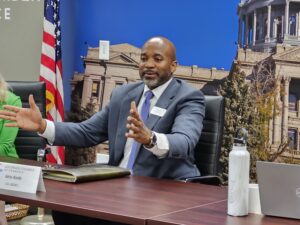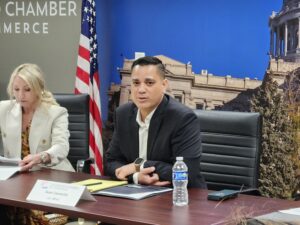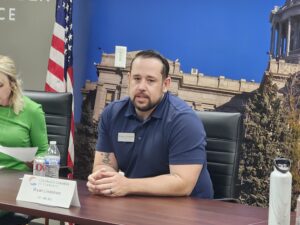After years of steady Democratic gains in the Legislature, both parties see the 2024 Colorado election as a pivotal moment for state policy — but one where the future of the state may be decided more in the primaries than in the general election.
Over roughly 20 legislative primaries spread across the Democrat and Republican parties, candidates with more ideological bents are pitted against those touting more moderate or pragmatic positions. Three sitting House Democrats and three legislative Republicans face primaries, and a high-dollar Senate Democratic primary features a liberal House member running against a legislative newcomer who argues the contest epitomizes the debate over the proper role of government.
Business issues ranging from housing to energy to labor regulations are very much at stake in the outcome of the primaries, and one House candidate argued that what happens at the ballot on June 25 could help define the issues in the 2026 open-seat gubernatorial race. For House Republicans, results could could determine if pragmatic caucus leadership seeking compromise with Democrats remains in place or is ousted by more staunch conservatives who believe outreach efforts have gained them nothing and should be scrapped.
“This election, and my election in particular, will probably determine the next 25 or 30 years in Colorado,” said Idris Keith, a politically moderate business attorney running against Rep. Mike Weissman in a Democratic primary for an open Aurora-area Senate seat. “This is a tipping point.”

Colorado Senate candidate Idris Keith speaks at a Colorado Chamber of Commerce event.
How we got here
In many ways, the state has been moving toward this moment since November 2018, when Democrats took back the state Senate and gained the “blue trifecta” over that chamber, the House and the governor’s office. Since then, they have increased their margins to a veto-proof 46-19 in the House and a near-veto-proof 23-12 in the Senate, leading to ideological cracks between a growing progressive faction and a more pragmatic wing seeking to limit some of the most sweeping efforts.
What makes this year’s primaries so important are that many of the ideological battles are taking place in safe Democratic or Republican seats where this month’s contest is almost certain to determine the winner of the November election. While Republicans can narrow the House margin by winning back some swing seats in the fall, candidates from both sides of the aisle said the interparty races also are pivotal because they will determine how majority Democrats and minority Republicans approach issues for the next two years.
Three of the House’s most liberal Democrats — Reps. Elisabeth Epps and Tim Hernandez of Denver and Junie Joseph of Boulder — face primaries from opponents who tout their differences in political beliefs, in approaches to governing or both. While former judge Cecilia Espenoza emphasizes her more moderate positions in running against labor supporter Hernandez, attorney Sean Camacho insists he is “pragmatically progressive” but seeking to be more of a consensus builder than Epps.

Colorado House candidate Sean Camacho speaks at a Colorado Chamber of Commerce event.
The race that’s arguably the most indicative of this year’s ideological schism is that between Keith and Weissman, which has become a target as well of significant special-interest funding.
Aurora races encapsulate differences in primaries
Weissman is an eight-year representative who has championed causes from environmental protection to plaintiffs’ rights to police reform, arguing in each case that democracy is strengthened by giving voice to those without wealth. Several of his bills have died in the more moderate Senate — including two straight efforts to make it easier for plaintiffs to file suits under the state’s Deceptive Trade Practices statute — and his presence could tilt the caucus to be more liberal.
Keith’s objections are laser-focused on Weissman’s policy positions, and he argues that with his party in line to gain a supermajority in the Senate, it needs members with a more limited-government approach rather than a “think-tank sort of ideology.” For example, he believes his race could play a key role in determining whether the Legislature could do more next year to advance construction-defects reform, which he espouses and Weissman has opposed — a difference too between pro-reform Camacho and Epps.

Colorado House candidate Bryan Lindstorm speaks at a Colorado Chamber of Commerce event.
Bryan Lindstrom, a labor supporter running against the more moderate Michael Carter in the Democratic primary for Weissman’s heavily Democratic House seat, called those races and others a “referendum” on the future of the party in the Legislature. The primary results could determine whether progressive issues he favors, such as a previously defeated effort to allow local governments to pass rent-control ordinances, could gain enough support to get to Gov. Jared Polis’ desk — and, even if vetoed, could become talking points in the 2026 race when Polis is term-limited.
“I think the 2024 election has kind of felt like a landmark of a decision on which direction the Democratic party is going to go,” Lindstrom told The Sum & Substance. “You’re seeing labor organizations getting involved that used to stay out of primaries. But you’re also seeing Republicans getting involved in Democratic primaries.”
GOP conundrum: To compromise or not?
Meanwhile, Republican hopefuls have targeted GOP Sens. Barbara Kirkmeyer of Brighton and Larry Liston of Colorado Springs and GOP Rep. Mary Bradfield of Fountain and accused them of not being conservative enough. And in a half-dozen other races for open GOP-held House and Senate seats, ranging from El Paso County to Castle Rock to Wellington, Republican candidates spar over the issue of whether to try to work with Democrats or try to shut down all legislation they oppose.

Colorado House candidate Lori Garcia Sander poses after speaking to a Colorado Chamber of Commerce event.
Lori Garcia Sander, a former principal, is running in the House District 65 primary to replace GOP Rep. Mike Lynch against Trent Leisy, a business owner who’s argued nothing good comes from compromise. Sander said there are numerous areas where Republicans and Democrats can work together — on passing further workforce-development legislation or looking to reduce fees, for example — and that the minority party can only do that if it talks with the other side of the aisle.
“You’ve got to listen to opposing viewpoints and maybe bring people to a win-win,” Sander said in an interview. “You don’t have to compromise your principals or your viewpoints, but you do have to listen to each other to get to the best outcome.”
A look at more key primaries
However, Jason Lupo, an El Paso County business owner running against former House staffer Jarvis Caldwell for a seat being vacated by GOP Rep. Don Wilson, said he believes Republicans have given away all leverage and gotten no compromise from Democrats. He prefers to pack committee hearings with opposition witnesses against regulatory increases or criminal-penalty rollbacks in order to slow bills — and he believes enough similar-minded Republicans could win primaries to force a change in House minority leadership.

Colorado House candidate Jason Lupo speaks at a Colorado Chamber of Commerce event.
“The Democrats don’t need any Republican help … There’s no concessions being made. The bills are as radical as ever. The bills are coming down as fast as ever,” Lupo said. “The people have to gain back the leverage.”
The Colorado Republican Party has jumped into several of the contested primaries this year to back what it considers to be the more conservative candidate over the moderate candidates, many of whom are getting endorsements from industry or business groups. Those include Leisy and Lupo, as well as Kirkmeyer challenger Natalie Abshier, Liston challenger Rex Tonkins, both people challenging Bradfield and Tim Arvidson, who is running against state Rep. Lisa Frizell for an open Senate seat.
The Democratic party has not gotten involved in its primaries, but several sitting House members who have cast key moderate or business-supporting votes also are involved in ideologically based primaries for open Senate seats. Those include Arvada Rep. Lindsey Daugherty, who is running against Westminster City Councilman Obi Ezeadi to replace term-limited Sen. Rachel Zenzinger, and Boulder Rep. Judy Amabile, who is running against educator Jovita Schiffer for the seat of term-limited Democratic Senate President Steve Fenberg.
